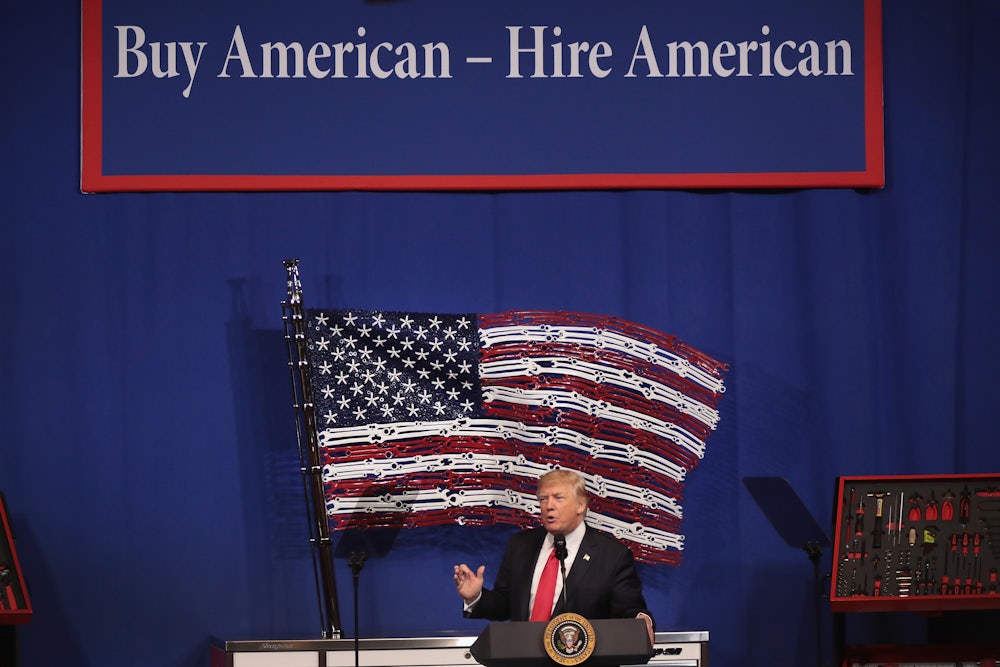President Trump’s decision to impose tariffs on steel and aluminum this spring was alarming for a number of reasons. The economic impact of tariffs may be negligible in the big picture, but they would certainly have negative repercussions for specific sectors of the U.S. economy. They alienated Canada and key allies in Europe and Asia for no good reason. There are good arguments for altering the U.S.’s trade agreements, but Trump’s tariffs, which have fed an embryonic trade war, were reckless and harmful.
Recent reporting suggests there’s more to come. Axios has reported that Trump has threatened “100 times” to withdraw from the World Trade Organization, telling advisers, “We always get fucked by [the WTO] I don’t know why we’re in it. The WTO is designed by the rest of the world to screw the United States.” Aides have presented the president with evidence that America has benefited quite a lot from being a part of the WTO, which has enjoyed broad bipartisan support since the U.S. effectively founded it in 1995. But Trump is having none of it, pushing a bill called the Fair and Reciprocal Trade Act that would kneecap the WTO by allowing the administration to jettison many of its most important rules.
If the United States were to leave the World Trade Organization it would be a disaster for global trade, entailing a possible global recession. That, thankfully, is not going to happen. The kinds of changes being proposed by the Trump administration would require congressional approval. Even for congressional Republicans who are yoked to Trump, free trade is a sore subject. For those who occasionally spar with him, like Senator Jeff Flake, it is a veritable third rail, with Flake recently announcing that he would not support the confirmation of any judges (except for Anthony Kennedy’s Supreme Court replacement) unless Trump de-escalates his budding trade war.
But Trump’s threats do provide a window into a White House that is increasingly merging pageantry with real policy. The administration’s saber-rattling is best read as a dramatic bluff, an attempt to convince allies (and, perhaps, markets) that he’s serious. The problem, however, is that there is little substance behind the bluff.
Trade is one of the few areas of policy where Trump has had consistent views going back decades. His belief is that the United States is being bled dry by poorly negotiated trade deals and that it needs to get tough with all the countries that are humiliating it. “A lot of people are tired of watching other countries ripping off the United States,” he said, back in 1987. “They laugh at us behind our backs. They laugh at us because of our own stupidity.” Trump’s consistency on this point surely played a role in his election victory, helping him break the “blue wall” in Michigan, Ohio, and Wisconsin.
That trade skepticism is Trump’s only long-standing policy position also means that his comments on trade are taken more seriously than his more off-the-cuff statements and (especially) tweets. Combined with the escalation of tariffs, the rest of the world has begun to loudly criticize the administration’s trade policies, which threaten to fracture the global system. On July 3, over 40 WTO countries—including the entirety of the European Union, China, and Russia—objected to a White House plan to impose tariffs on automobiles. At the WTO headquarters in Geneva, officials warned that the “United States was losing its reputation as a trusted trade partner.”
At the same time, the White House has made it very clear that Trump does not care much for the WTO, further inflaming tensions between the U.S., the organization, and member countries. “It is no secret that POTUS has had frustrations with the unfair imbalance of tariffs that put the U.S. at a disadvantage,” a White House spokesman told Axios. “He has asked his team to develop ideas to remedy this situation and create incentives for countries to lower their tariffs. The current system gives the U.S. no leverage and other countries no incentive.”
When Trump was asked about the Axios report in person on Monday, he doubled down. “The WTO has treated the United States very badly, and I hope they change their ways,” he said. “We’re not planning anything now but if they don’t treat us properly we will be doing something.” The Trump administration has also weakened the organization by vetoing appointments to its judicial appeals chamber, even though the United States wins the vast majority of its own appeals.
The leaking of the Fair And Reciprocal Trade Act should be seen as part of this larger—and largely superficial—attack on the global trade system. The administration is flexing, making it clear that the president does not care for the World Trade Organization, that the United States can’t be pushed around, and that, if other countries don’t surrender to Trump’s demands, he could blow up the WTO as payback.
But it’s important to remember that Trump’s actions on trade are being made for domestic political reasons. While studies show that the effect of the current tariffs and counter-tariffs disproportionately hurt states that voted for Trump, the president is trying to show that, as we approach the midterms, he is keeping the promises he made regarding trade on the campaign trail in 2016. This is partly why his moves on trade don’t make much sense in concert—a tariff on foreign cars may result in a lift for domestic automobile production, but a tariff on foreign steel does nothing to encourage car manufacturers in America.
Trump could very well spark a trade war. But it would not be a coherent one. This is because Trump is using the pageantry of a trade war, with all the headlines such a prospect provokes, to communicate to voters, particularly in the Midwest, that he still has their back—even though that’s certainly not true in any real sense.
